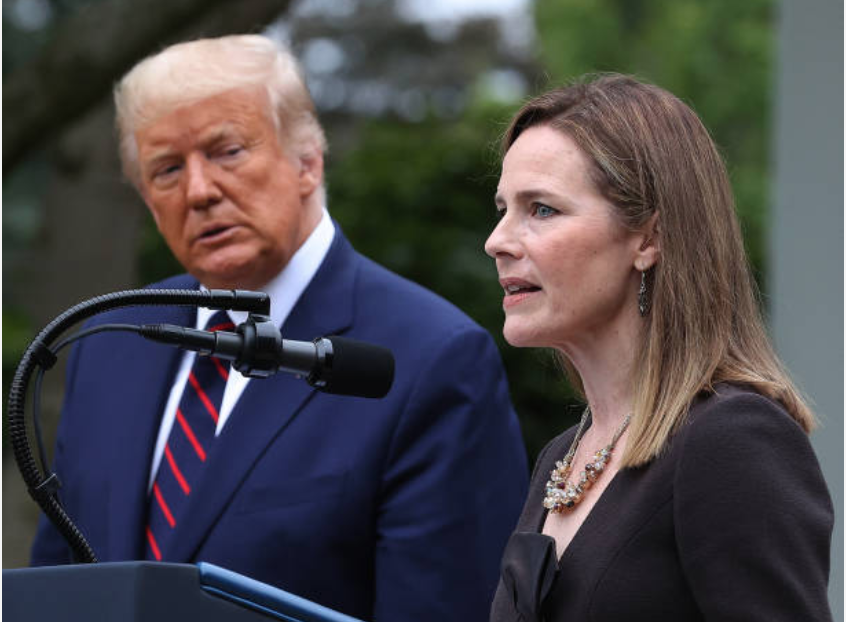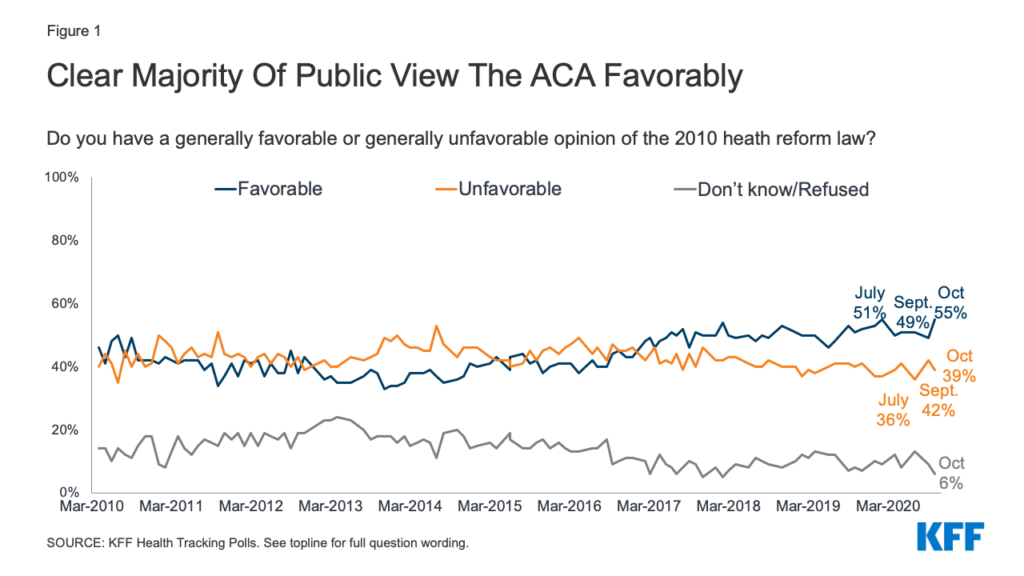The newly appointed justice leaves some worried about the Affordable Care Act, LGBTQ2S+ and women’s rights, and a generation of minority rule

Amy Coney Barrett was confirmed to the U.S. Supreme Court last Monday by a 52-48 Senate vote, largely along party lines. It was the first time in 151 years a justice didn’t receive a single vote from the minority party.
For Americans studying at Ryerson, the impacts of a two-thirds conservative majority (six of the nine current justices were nominated by Republican presidents) on the nation’s top court could have immediate effects, especially given Barrett’s views on the Affordable Care Act (ACA), Roe vs. Wade, and LGBTQ2S+ rights.
Barrett’s confirmation signals a conservative shift in the judiciary that could last for generations. A third of the nation’s top court is now populated by President Donald Trump appointees who, with an average age of 52, are guaranteed their spots on the bench for life.
Wayne Petrozzi, professor of politics and public administration at Ryerson University, says the rush to have Barrett confirmed was because Republicans might not have had the chance beyond the Nov. 3 election.
“Should you end up in a lame duck (session) with a Biden presidency, you’re also likely going to have a number of senators who will be lame ducks in a real sense—they will have lost. The pressure on them and the disrepute it would bring to have senators defeated, but nonetheless casting a ballot for the court—that’s not something they would want to do.”
Affordable Care Act
Barrett is now a Supreme Court justice and the ACA will appear before the court for arguments on Nov. 10. More than 20 million people are able to afford health insurance through provisions of the ACA, which include subsidies for individual market coverage, reforms to the individual insurance market, Medicaid expansion to low-income adults, and allowing children under the age of 26 to stay on their parents’ plan.
“My mom’s a teacher and they get really good health benefits, so my whole family is under my mom,” says second-year Ryerson student Eleanor De Martini, who adds she still sees doctors in her home state of New York when she is home.
Under provisions of the ACA, De Martini can stay on her mother’s plan until she turns 26. If the law is repealed, she may not have this option.
Dozens of efforts have been made by congressional Republicans to repeal the law, but the Supreme Court has largely upheld it. The individual mandate of the ACA — a requirement individuals buy health insurance or pay a fine — was nullified as part of Trump’s Tax Cuts and Jobs Act of 2017.
However, this could change with Barrett’s recent confirmation as she has been critical of the 2012 opinion of Chief Justice John Roberts, who wrote for the majority that year and ruled the individual mandate of the law constituted a tax and therefore fell within the scope of Congress.
The issue before the court on Nov. 10 is on the matter of “severability,” which asks whether a law can be upheld in its entirety if part of it (the individual mandate) is struck down.
“That’s not something that I have ever talked about with respect to the Affordable Care Act,” Barrett said in her confirmation hearings. “Honestly, I haven’t written anything about severability that I know of at all.”
Support for the ACA has increased steadily since 2017, giving it a firmer grounding as its provisions take effect. This makes its legislative repeal more difficult.

“It’s also politically tricky for Republicans in the sense that the Affordable Care Act is broadly popular — they had a chance to repeal it,” says Rob Goodman, assistant professor of politics and public administration at Ryerson University.
“When they had control of both houses of Congress and the presidency in the early Trump years, they chose not to. They weren’t able to get a majority around that. And that’s because a lot of the parts of law are still broadly popular,” he adds.
Trump campaigned in 2016 on a plan to repeal the ACA and promised to appoint judges who would repeal the law.
“Trump’s been promising to get rid of that since the beginning of his presidency, and her nomination could really be the end of it,” says third-year Ryerson journalism student Tess Stuber, who submitted her mail-in ballot for the Nov. 3 election to her home state of Ohio two weeks ago.
“Without it, you’re leaving all of those people without health care during a global pandemic — we cannot reasonably expect that to go well. It makes no sense. It is already insanely hard to get health care in the United States.”
Goodman says the advantage of trying to overturn the ACA through the courts is that politicians can retain some plausible deniability.
“You can have politicians saying things like, ‘We want to protect people with pre-existing conditions. We want to have a strong health-care plan, not take away health care,’ while unelected judges who aren’t really accountable for their decisions go do these things anyway,” says Goodman.
He adds the people who supported Barrett’s nomination and the people who voted for her know what they’re doing.
“They’re very effective political operators,” says Goodman. “Although it’s not really done to say publicly how she would rule on this case, I doubt that she would be nominated if she wasn’t behind the legal agenda of the organized conservative movement, which is still strongly anti-Affordable Care Act.”
LGBTQ2S+ and Roe vs. Wade
Stuber identifies as a queer woman and says anybody below the poverty line identifying as LGBTQ2S+ would lose access to some of the essential health care they need if the ACA is overturned. She also added the confirmation is heartbreaking in terms of its many other possibilities for LGBTQ2S+ people.
“It’s super scary to think about what her confirmation means for the LGBT+ community. She has been pretty open about her core beliefs. She claims that her religious opinions will not affect her decisions, but of course, we know that that is not true when we look at her voting record,” says Stuber.
During her confirmation hearing, Barrett showed support for landmark decisions that desegregated schools and allowed interracial marriages, but stopped short in endorsing Obergefell vs. Hodges, the court’s 2015 decision allowing same-sex couples the right to marry. She also declined to say whether Lawrence vs. Texas, which decriminalizes homosexual intimacy, was correctly decided.
Women’s rights could also be in jeopardy following Barrett’s appointment to the court. The new Supreme Court justice acknowledged putting her name on two anti-abortion rights advertisements in 2006. There is broad opposition to overturning Roe vs. Wade, a landmark 1973 Supreme Court decision that protects a pregnant person’s right to abortion without excessive government restriction. However, it could find its way back to the Supreme Court very soon.
“I feel like all women should have access to birth control and abortion. What’s scary to me is a lot of women now probably (would) go and do illegal abortions, which can end up doing a lot more harm than if (they) were to go to a normal clinic,” says De Martini.
Contraception coverage through the ACA is also at risk with the upcoming Supreme Court case, California vs. Texas. The act covers one type of birth control per person from each of the 18 FDA approved categories. Also, plans in the health insurance marketplace must cover contraceptive methods and counselling for all women, as prescribed by a doctor. Congress has zeroed out the penalty for the individual mandate, but if it is found to be unconstitutional and unable to be severed from the law, the overturning of the ACA would eliminate these protections.
Minority Rule
Goodman says Barrett’s confirmation is one more thing Republicans are doing to try to perpetuate minority rule using the system and rules as they exist rather than trying to appeal to a bigger segment of the population.
“It doesn’t really matter that the majority of senators who are voting represent a minority of people in the country. It doesn’t matter that Trump didn’t win a majority of popular vote. It doesn’t matter that the election is already underway,” says Goodman.
The senators who voted against Barrett represent 13.6 million more people than the senators who voted for her and the president who nominated her received 2.87 million fewer votes than his opponent in the 2016 election.
“I think what unpopular political formations can do in the U.S., using the constitutional rules, is entrenching their power way after they’ve been repudiated by the voters, because the constitutional system lets them do that,” adds Goodman.
Stuber and De Martini say they want to make sure their voices are heard in the upcoming election. Each has cast their vote in the election by mail-in ballot. Both are nervous, but optimistic, about the election.
“I’m not panicking for Tuesday, because Tuesday is not the end of anything. Tuesday is simply the beginning,” says Stuber.
Results will start trickling in on Tuesday evening, but it could be days before winners of the U.S. elections are known, due primarily to the delay in counting absentee and mail-in ballots. Here is a state-by-state estimate of the wait times for results.
This article may have been created with the use of AI tools such as
